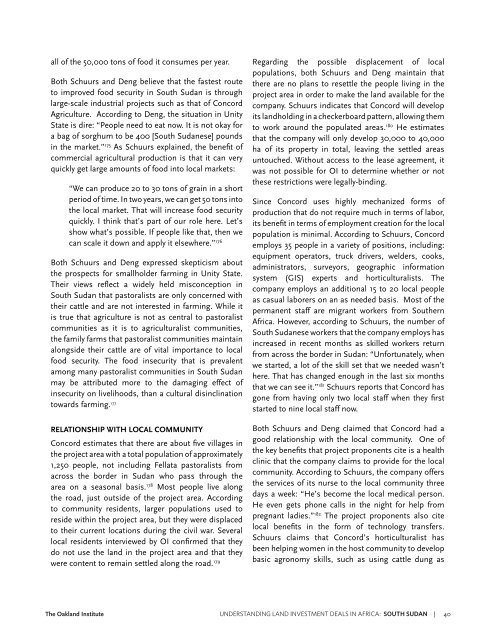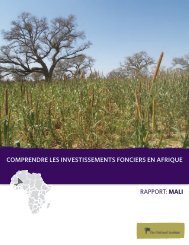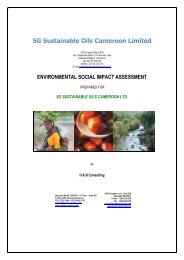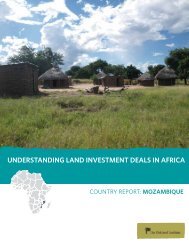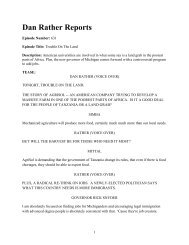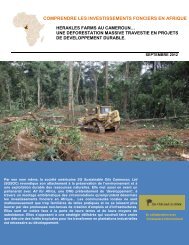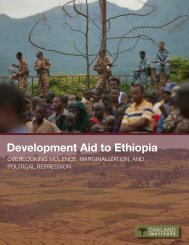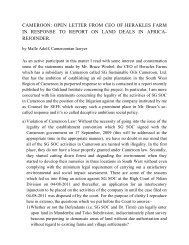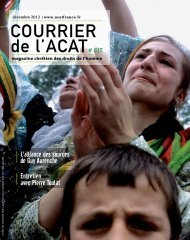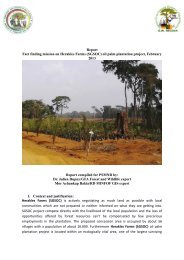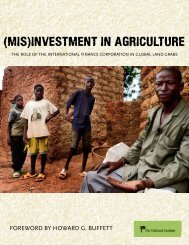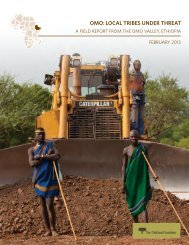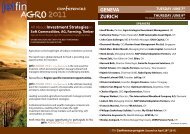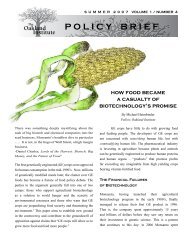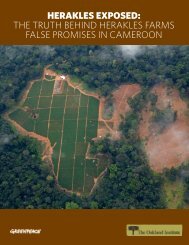understanding land investment deals in africa - Oakland Institute
understanding land investment deals in africa - Oakland Institute
understanding land investment deals in africa - Oakland Institute
- No tags were found...
You also want an ePaper? Increase the reach of your titles
YUMPU automatically turns print PDFs into web optimized ePapers that Google loves.
all of the 50,000 tons of food it consumes per year.Both Schuurs and Deng believe that the fastest routeto improved food security <strong>in</strong> South Sudan is throughlarge-scale <strong>in</strong>dustrial projects such as that of ConcordAgriculture. Accord<strong>in</strong>g to Deng, the situation <strong>in</strong> UnityState is dire: “People need to eat now. It is not okay fora bag of sorghum to be 400 [South Sudanese] pounds<strong>in</strong> the market.” 175 As Schuurs expla<strong>in</strong>ed, the benefit ofcommercial agricultural production is that it can veryquickly get large amounts of food <strong>in</strong>to local markets:“We can produce 20 to 30 tons of gra<strong>in</strong> <strong>in</strong> a shortperiod of time. In two years, we can get 50 tons <strong>in</strong>tothe local market. That will <strong>in</strong>crease food securityquickly. I th<strong>in</strong>k that’s part of our role here. Let’sshow what’s possible. If people like that, then wecan scale it down and apply it elsewhere.” 176Both Schuurs and Deng expressed skepticism aboutthe prospects for smallholder farm<strong>in</strong>g <strong>in</strong> Unity State.Their views reflect a widely held misconception <strong>in</strong>South Sudan that pastoralists are only concerned withtheir cattle and are not <strong>in</strong>terested <strong>in</strong> farm<strong>in</strong>g. While itis true that agriculture is not as central to pastoralistcommunities as it is to agriculturalist communities,the family farms that pastoralist communities ma<strong>in</strong>ta<strong>in</strong>alongside their cattle are of vital importance to localfood security. The food <strong>in</strong>security that is prevalentamong many pastoralist communities <strong>in</strong> South Sudanmay be attributed more to the damag<strong>in</strong>g effect of<strong>in</strong>security on livelihoods, than a cultural dis<strong>in</strong>cl<strong>in</strong>ationtowards farm<strong>in</strong>g. 177Relationship with Local CommunityConcord estimates that there are about five villages <strong>in</strong>the project area with a total population of approximately1,250 people, not <strong>in</strong>clud<strong>in</strong>g Fellata pastoralists fromacross the border <strong>in</strong> Sudan who pass through thearea on a seasonal basis. 178 Most people live alongthe road, just outside of the project area. Accord<strong>in</strong>gto community residents, larger populations used toreside with<strong>in</strong> the project area, but they were displacedto their current locations dur<strong>in</strong>g the civil war. Severallocal residents <strong>in</strong>terviewed by OI confirmed that theydo not use the <strong>land</strong> <strong>in</strong> the project area and that theywere content to rema<strong>in</strong> settled along the road. 179Regard<strong>in</strong>g the possible displacement of localpopulations, both Schuurs and Deng ma<strong>in</strong>ta<strong>in</strong> thatthere are no plans to resettle the people liv<strong>in</strong>g <strong>in</strong> theproject area <strong>in</strong> order to make the <strong>land</strong> available for thecompany. Schuurs <strong>in</strong>dicates that Concord will developits <strong>land</strong>hold<strong>in</strong>g <strong>in</strong> a checkerboard pattern, allow<strong>in</strong>g themto work around the populated areas. 180 He estimatesthat the company will only develop 30,000 to 40,000ha of its property <strong>in</strong> total, leav<strong>in</strong>g the settled areasuntouched. Without access to the lease agreement, itwas not possible for OI to determ<strong>in</strong>e whether or notthese restrictions were legally-b<strong>in</strong>d<strong>in</strong>g.S<strong>in</strong>ce Concord uses highly mechanized forms ofproduction that do not require much <strong>in</strong> terms of labor,its benefit <strong>in</strong> terms of employment creation for the localpopulation is m<strong>in</strong>imal. Accord<strong>in</strong>g to Schuurs, Concordemploys 35 people <strong>in</strong> a variety of positions, <strong>in</strong>clud<strong>in</strong>g:equipment operators, truck drivers, welders, cooks,adm<strong>in</strong>istrators, surveyors, geographic <strong>in</strong>formationsystem (GIS) experts and horticulturalists. Thecompany employs an additional 15 to 20 local peopleas casual laborers on an as needed basis. Most of thepermanent staff are migrant workers from SouthernAfrica. However, accord<strong>in</strong>g to Schuurs, the number ofSouth Sudanese workers that the company employs has<strong>in</strong>creased <strong>in</strong> recent months as skilled workers returnfrom across the border <strong>in</strong> Sudan: “Unfortunately, whenwe started, a lot of the skill set that we needed wasn’there. That has changed enough <strong>in</strong> the last six monthsthat we can see it.” 181 Schuurs reports that Concord hasgone from hav<strong>in</strong>g only two local staff when they firststarted to n<strong>in</strong>e local staff now.Both Schuurs and Deng claimed that Concord had agood relationship with the local community. One ofthe key benefits that project proponents cite is a healthcl<strong>in</strong>ic that the company claims to provide for the localcommunity. Accord<strong>in</strong>g to Schuurs, the company offersthe services of its nurse to the local community threedays a week: “He’s become the local medical person.He even gets phone calls <strong>in</strong> the night for help frompregnant ladies.” 182 The project proponents also citelocal benefits <strong>in</strong> the form of technology transfers.Schuurs claims that Concord’s horticulturalist hasbeen help<strong>in</strong>g women <strong>in</strong> the host community to developbasic agronomy skills, such as us<strong>in</strong>g cattle dung asThe Oak<strong>land</strong> <strong>Institute</strong> <strong>understand<strong>in</strong>g</strong> <strong>land</strong> <strong><strong>in</strong>vestment</strong> <strong>deals</strong> <strong>in</strong> <strong>africa</strong>: south sudan | 40


